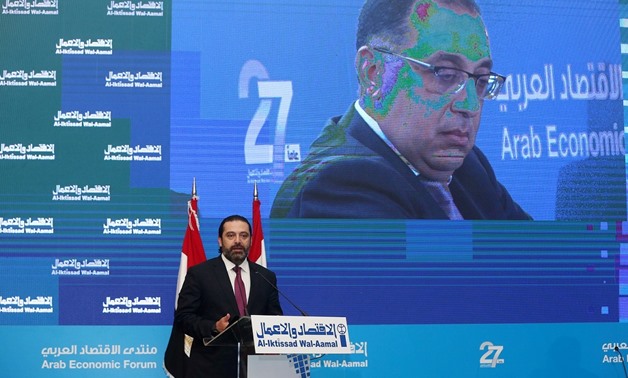
Egyptian Prime Minister Mostafa Madbouly is seen on screen listening as Lebanon's Prime Minister Saad al-Hariri addresses the Arab Economic Forum in Beirut, Lebanon, May 2, 2019. REUTERS/Mohamed Azakir
CAIRO – 3 May 2019: Lebanese Prime Minister Saad Al-Hariri has said his country’s leadership is convinced of the need to achieve reforms, despite difficulties, for the benefit of citizens, stressing that Lebanon looks forward to achieving what Egypt has been able to achieve in this field.
Hariri stated his comments during his participation in the Arab Economic Forum 2019 at the Four Seasons Hotel, with the participation of the Egyptian Prime Minister Dr. Mostafa Madbouly and many Egyptian, Lebanese and Arab officials and businessmen.
He further praised Egypt’s economic model and said that his country should learn from Egypt on how to stimulate economic growth, reform laws and combat corruption.
He said President Abdel Fatah al-Sisi has “changed Egypt’s direction” and pushed his country forward after a period of stagnation.
“President Sisi discovered to what extent Egypt is falling behind, as we are today in Lebanon in terms of our old laws, so we must update all the laws in Lebanon as Egypt has done in recent years and continues to do so.
“Therefore, we have to learn from the Egyptian experience and expertise, whether in the fields of electricity, communications, gas, oil or other sectors. What we are trying to do today in Lebanon is actually the same as Egypt did, but the difference is that Egypt suffered economically more than Lebanon.”
The minister highlighted the legislative and institutional reforms implemented by the government, which attracted investors through “reducing the restrictions on the exchange rate, boosting foreign currency reserves and bringing down both the deficit of state budget and public debt.”
Comments
Leave a Comment